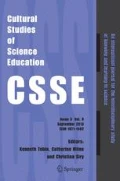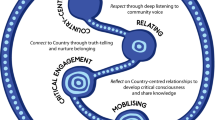Abstract
This is a single-case study of Teresa, a Latina secondary science teacher, who reflected on her experiences with her Latinx bilingual immigrant students and families and other science educators in a dialogic science learning community. Bearing witness to Teresa’s commitment and ongoing struggles for a more inclusive science teaching, we aimed to better understand the realistic potential of dialogic science learning communities in supporting teachers, like Teresa, in their effort to enact a science teaching inclusive of their students’ families and communities while functioning within the constraints of policy structures in schools. Grounded in a Freirean notion of dialogic education, this study used focus group interview, individual interview, and participation observation methods for data collection and analysis. Our findings indicated that Teresa’s participation in the professional learning program led her to restructure her work with her students and their families through dialogue-based learning interactions in the classroom and through actively working with parents as willing partners to engage students in science learning both in and beyond school. Our findings point to the power of dialogic science learning communities when working with bilingual immigrant students, in which teachers develop close companionship with students, families, and colleagues in ways that build teacher knowledge while also supporting teachers’ efforts navigating the challenges and tensions of teaching science in today’s conflicted sociopolitical context.


Similar content being viewed by others
References
Acosta, C. (2013). Pedagogies of resiliency and hope in response to the criminalization of Latino students. Journal of Language and Literacy Education., 9(2), 63–71.
Aikenhead, G., & Michell, H. J. (2011). Bridging cultures: indigenous and scientific ways of knowing nature. London: Pearson Education Canada.
Aikenhead, G. S., Brokofsky, J., Bodnar, T., Clark, C., Foley, C., Hingley, J., & Strange, G. (2014). Enhancing school science with Indigenous knowledge: What we know from teachers and research. Saskatoon: Saskatoon Public Schools.
Arreguin-Anderson, M. G., Torres, R., & Ruiz-Escalante, J. A. (2013). Critical dialogue: Perspectives and practices of three bilingual elementary science teachers. Journal of Border Educational Research, 10(1), 70–83.
Buxton, C. A., Allexsaht-Snider, M., & Rivera, C. (2012). Science, language, and families: constructing a model of steps to college through language-rich science inquiry. In J. Bianchini, V. Akerson, A. Calabrese Barton, O. Lee, & A. Rodriguez (Eds.), Moving the equity agenda forward: equity research, practice, and policy in science education (pp. 241–250). New York: Springer.
Buxton, C. A., Kayumova, S., & Allexsaht-Snider, M. (2013). Teacher, researcher, and accountability discourses: creating space for democratic science teaching practices in middle schools. Democracy and Education, 21(2), 2–10.
Buxton, C., Allexsaht-Snider, M., Kayumova, S., Aghasaleh, R., Choi, Y., & Cohen, A. (2015). Teacher agency and professional learning: rethinking fidelity of implementation as multiplicities of enactment. Journal of Research in Science Teaching, 52(4), 489–502.
Buxton, C. A., Allexsaht-Snider, M., Hernandez-Rodriguez, Y., Aghasaleh, R., Cardozo-Gaibisso, L., & Kirmaci, M. (2016). A design-based model of science teacher professional learning in the LISELL-B project. In A. Oliveira & M. Weinburgh (Eds.), Science teacher preparation in content-based second language acquisition. New York: Springer.
Calabrese Barton, A., Tan, E., & Greenberg, D. (2017). The makerspace movement: sites of possibilities for equitable opportunities to engage underrepresented youth in STEM. Teachers College Record, 119(6), 1–30.
Chinn, P. (2006). Preparing science teachers for culturally diverse students: developing cultural literacy through cultural immersion, cultural translators and communities of practice. Cultural Studies of Science Education, 1(2), 367–402. https://doi.org/10.1007/s11422-006-9014-0
Freire, P. (1970). Pedagogy of the oppressed. London: Continuum.
Freire, P., & Macedo, D. (1987). Literacy: Reading the word and the world. South Hadley: Bergin & Garvey.
Freire, P., & Macedo, D. (1995). A dialogue: Culture, language, and race. Harvard Educational Review, 65(3), 377–403.
Freire, P. (1998). Pedagogy of freedom: Ethics, democracy, and civic courage. Lanham: Rowman & Littlefield.
Freire, P. (2005). Teachers as cultural workers: Letters to those who dare teach. Boulder: Westview Press.
Freire, P. (2013). Education for critical consciousness. London: Bloomsbury Publishing.
Georgia Department of Education (GADOE). (2017). Enrollment by ethnicity/race and gender. Retrieved from https://oraapp.doe.k12.ga.us/owsbin/owa/fte_pack_ethnicsex_public.entry_form
Gonzalez, N., Moll, L. C., & Amanti, C. (Eds.). (2005). Funds of knowledge: Theorizing practices in households, communities, and classrooms. Abingdon: Routledge.
González, R. A. (2011). Schools as radical sanctuaries: Decolionizing urban education through the eyes of youth of color. Charlotte: Information Age.
Guyll, M., Madon, S., Prieto, L., & Scherr, K. C. (2010). The potential roles of self-fulfilling prophecies, stigma consciousness, and stereotype threat in linking Latino/a ethnicity and educational outcomes. Journal of Social Issues, 66(1), 113–130.
Hamann, E. T., & Harklau, L. (2015). Revisiting education in the new Latino diaspora. In E. T. Hamann, S. Wortham, & E. G. Murillo (Eds.), Revisiting education in the new Latino diaspora (pp. 153–170). Charlotte: Information Age.
Hamann, E. T., Wortham, S., & Murillo, E. G. (2002). Education and policy in the New Latino Diaspora. In S. Wortham, E. G. Murillo, & E. T. Hamann (Eds.), Education in the new Latino diaspora (pp. 1–16). New York: Ablex.
Hammond, L. (2001). Notes from California: an anthropological approach to urban science education for language minority families. Journal of Research in Science Teaching, 38(9), 983–999. https://doi.org/10.1002/tea.1043
Harper, S. (2016). Keystone characteristics that support cultural resilience in Karen refugee parents. Cultural Studies of Science Education, 11(4), 1029–1060. https://doi.org/10.1007/s11422-015-9681-9
Hollie, S. (2017). Culturally and linguistically responsive teaching and learning: classroom practices for student success. Huntington Beach: Shell Education.
Kayumova, S., Karsli, E., Allexsaht-Snider, M., & Buxton, C. (2015). Latina mothers and daughters: Ways of knowing, being, and becoming in the context of bilingual family science workshops. Anthropology & Education Quarterly, 46(3), 260–276.
Kirmaci, M., Buxton, C., & Allexsaht-Snider, M. (2019). What happens when teachers come together with Latino families in a science learning context. Urban Education. https://doi.org/10.1177/0042085919877934.
Kohli, R. (2017). Behind school doors: The impact of hostile racial climates on urban teachers of color. Urban Education, 53(3), 307–333.
Luna, N., & Revilla, A. T. (2019). Understanding Latina/o school pushout: Critical readings on Latinos and education. In E. G. Murillo (Ed.), critical readings on Latinos and education (pp. 159–178). Abingdon: Routledge.
Merriam, S. B. (2009). Qualitative research: a guide to design and implementation. San Francisco: Jossey-Bass.
Nader, L. (1996). Naked science: anthropological inquiry into boundaries, power, and knowledge. Abingdon: Routledge.
National Academies of Sciences, Engineering, and Medicine. (2017). Promoting the educational success of children and youth learning English: Promising futures. Washington, DC: The National Academies Press. https://doi.org/10.17226/24677
National Center for Education Statistics. (2015). EDFacts Data Groups 695 and 696, School Year 2013–14. Retrieved from https://nces.ed.gov/ccd/tables/ACGR_RE_and_characteristics_2013-14.asp
National Research Council. (2012). A framework for K-12 science education: Practices, crosscutting concepts, and core ideas. Washington: National Academies Press.
National Science Foundation. (2018). NSF includes: Report to the nation. Retrieved from www.nsf.gov
NGSS lead states. (2013). Next Generation Science Standards: For states, by states. Washington, D.C.: National Academies Press.
Nieto, S. (2003). Challenging current notions of “highly qualified teachers” through work in a teachers’ inquiry group. Journal of Teacher Education, 54(5), 386–398.
Quiñones, S. (2019). Negotiating entangled contradictions about being well educated: Nudos (Knots) in the lives of bilingual Latina teachers. NABE Journal of Research and Practice, 6(1), 50–88.
Ramirez, O., McCollough, C. A., & Diaz, Z. (2016). Creating a model of acceptance: Preservice teachers interact with non-English-speaking Latino parents using culturally relevant mathematics and science activities at family learning events. School Science and Mathematics, 116(1), 43–54.
Rosebery, A. S., Ogonowski, M., DiSchino, M., & Warren, B. (2010). “The coat traps all your body heat”: heterogeneity as fundamental to learning. The Journal of the Learning Sciences, 19(3), 322–357. https://doi.org/10.1080/10508406.2010.491752
Russakoff, D. (2017, Jan 25). The only way we can fight back is to excel: undocumented students face an uncertain future under the Trump administration. The New York Times Magazine. Retrieved from https://www.nytimes.com/2017/01/25/magazine/the-only-way-we-can-fight-back-is-to-excel.html
United States Immigration and Customs Enforcement. (2016). Delegation of immigration authority section 287(g) immigration and nationality act. Retrieved from https://www.ice.gov/factsheets/287g
Upadhyay, B. (2009). Teaching science for empowerment in an urban classroom: A case study of a Hmong teacher. Equity and Excellence in Education, 42(2), 217–232. https://doi.org/10.1080/10665680902779366
Windschitl, M., & Thompson, J. (2006). Transcending simple forms of school science investigation: the impact of preservice instruction on teachers’ understandings of model-based inquiry. American Educational Research Journal, 43(4), 783–835.
Valenzuela, A. (1999). Subtractive schooling: U.S.-Mexican youth and the politics of caring. New York: State University of New York Press.
Acknowledgement
In this paper, we use term bilingual immigrant students to refer to learners who speak languages other than English as well as English and who are in a dynamic process of developing competencies to be able to function in their home language and that of the school to emphasize the learners’ bilingual identities and positive characteristics of bilingualism as potential resources to be used at schools. When referring to immigrants, we consider both those who relocated to the USA from their country of usual residence for a long-term or permanent duration, and to those born in the USA but whose parents were born abroad. This work was supported by the National Science Foundation under Grant Number # DRL-1316398. Opinions and conclusions are those of the authors and do not necessarily reflect the views of the National Science Foundation.
Author information
Authors and Affiliations
Corresponding author
Additional information
Publisher's Note
Springer Nature remains neutral with regard to jurisdictional claims in published maps and institutional affiliations.
Lead editor: L. Avraamidou.
Rights and permissions
About this article
Cite this article
Kirmaci, M., Buxton, C.A. & Allexsaht-Snider, M. A Latina science teacher becoming a dialogic educator: “I’m okay being hated because somebody has to be strong”. Cult Stud of Sci Educ 16, 1211–1237 (2021). https://doi.org/10.1007/s11422-020-10009-5
Received:
Accepted:
Published:
Issue Date:
DOI: https://doi.org/10.1007/s11422-020-10009-5



